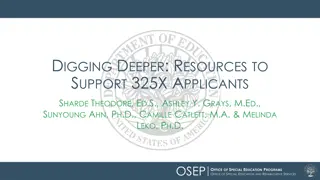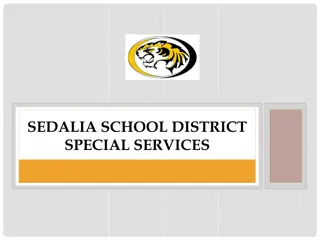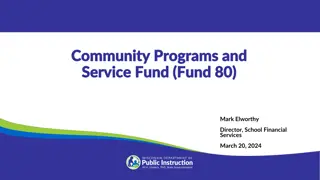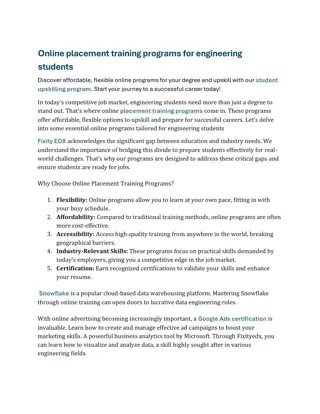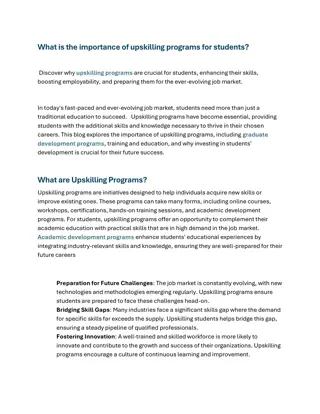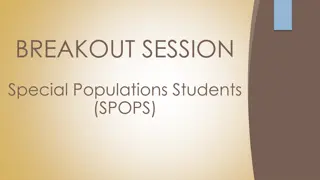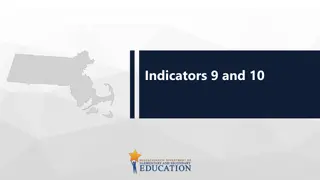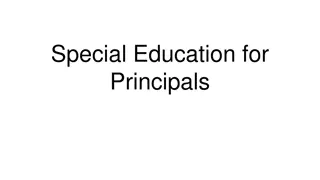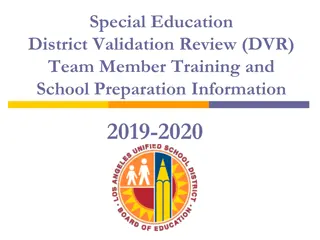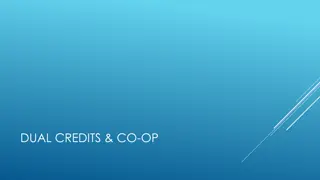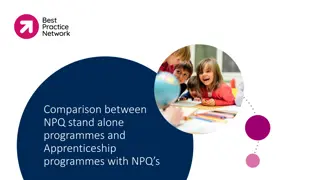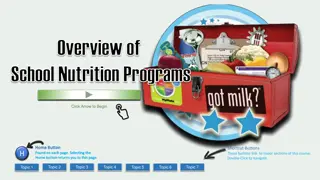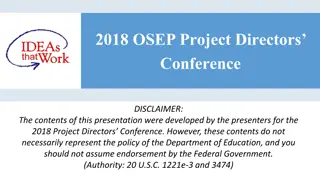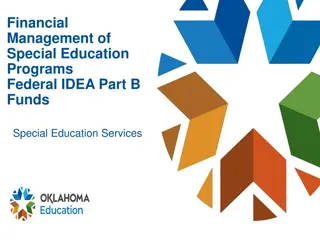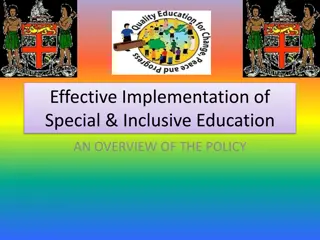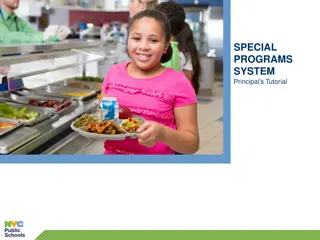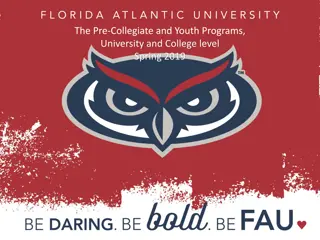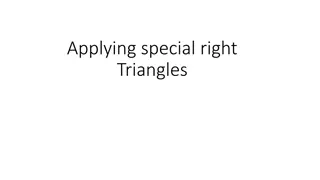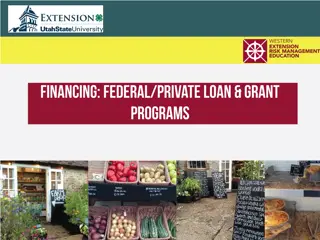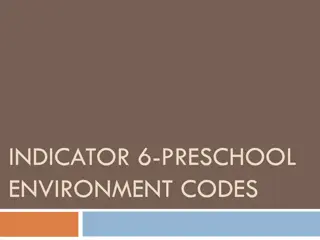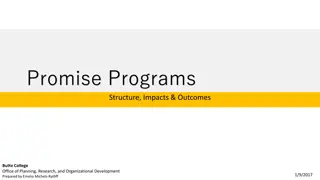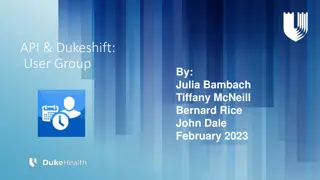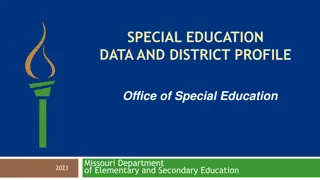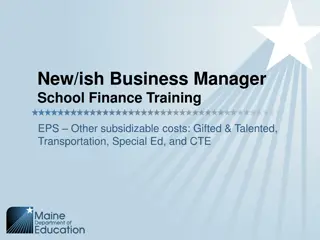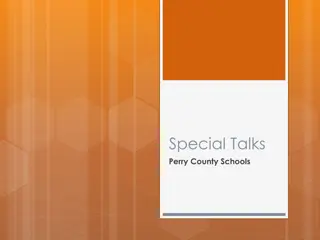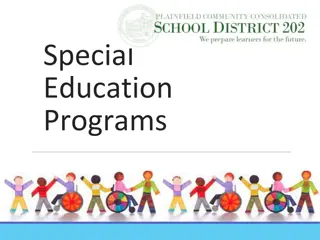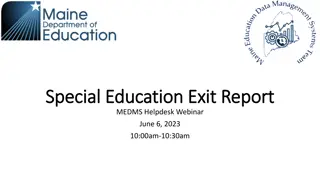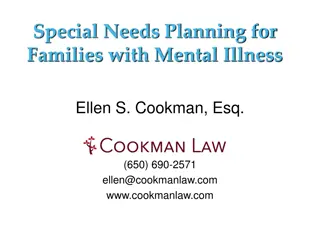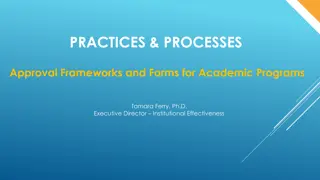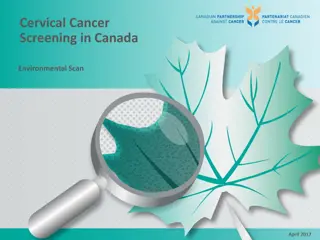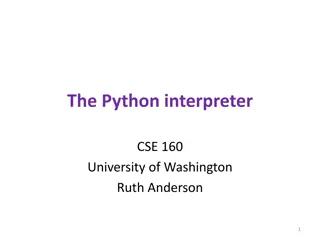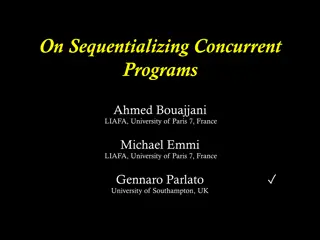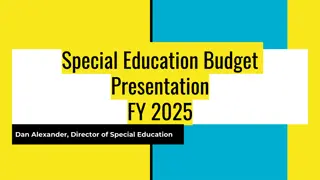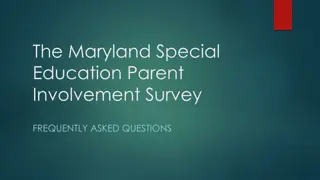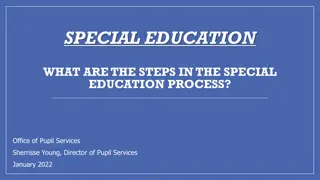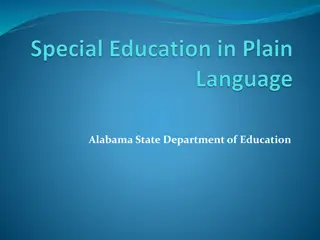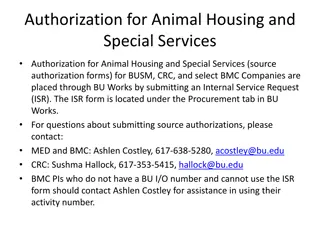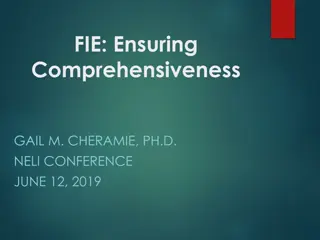Special Education Circuit Breaker Program Overview FY2024
The Special Education Circuit Breaker Program for FY2024 provides financial assistance to public school districts for high-cost special education services. The program includes Relief Claims and Year-End Claims cycles, with legal references for reimbursement guidelines. Reserve Relief funds are avai
1 views • 27 slides
Enhancing Diversity in Special Education Programs: A Focus on HBCUs, TCCUs, and MSIs
This collection of resources highlights the importance of increasing diversity in special education programs by supporting Historically Black Colleges and Universities (HBCUs), Tribal Colleges and Universities (TCCUs), and Minority-Serving Institutions (MSIs). The content covers the significance of
1 views • 26 slides
Special Services Programs at Sedalia School District #200
Special Services at Sedalia School District #200 include Special Education, Early Childhood Special Education, REACH Gifted Program, Health Services, Homebound, and Juvenile Intervention Program. The district focuses on providing a challenging education in a safe environment to all students, aiming
0 views • 11 slides
Community Programs and Service Fund (Fund 80) Overview
The Community Programs and Service Fund (Fund 80) is a local taxpayer-funded initiative that allows school boards to provide community education, training, recreational, cultural, and athletic programs and services. This fund is separate from the regular school curriculum and operates under specific
0 views • 20 slides
Online placement training programs for engineering students
Discover affordable, flexible online programs for your degree and upskill with our student upskilling program. Start your journey to a successful career today! \n\nIn today's competitive job market, engineering students need more than just a degree to stand out. That's where online placement trainin
0 views • 2 slides
What is the importance of upskilling programs for students?
Discover why upskilling programs are crucial for students, enhancing their skills, boosting employability, and preparing them for the ever-evolving job market. \n\n \n\nIn today's fast-paced and ever-evolving job market, students need more than just a traditional education to succeed. Upskilling p
0 views • 2 slides
Understanding Special Populations Students in CTE Programs
Special Populations Students in Career and Technical Education (CTE) programs include individuals with disabilities, economically disadvantaged individuals, single parents, English Language Learners, migrants, homeless individuals, and more. These students may require Individualized Education Progra
0 views • 9 slides
Analysis of Indicators 9 & 10 in Special Education Representation
The indicators 9 and 10 focus on the disproportionate representation of racial and ethnic groups in special education programs. Specifically, Indicator 9 looks at the overall disproportionate representation of groups eligible for special education, while Indicator 10 examines the disproportions with
1 views • 8 slides
Understanding Special Education Monitoring and Support for Principals
Special Education for Principals involves navigating a complex world of federal and state rules under the Individuals with Disabilities Education Act. Principals play a crucial role in monitoring and supervising special education, despite facing challenges due to lack of dual licensing. Special Educ
1 views • 29 slides
Special Education District Validation Review (DVR) 2019-2020 Overview
The Special Education District Validation Review (DVR) is a mandated internal monitoring process for LAUSD Special Education programs. It involves reviewing 25% of schools annually to identify and remediate noncompliance issues at both school and systemic levels, ensuring adherence to District polic
0 views • 32 slides
Exploring Dual Credits and Cooperative Education Programs
Dual credit programs offer high school students the opportunity to earn college credits while completing their secondary education, potentially leading to a post-secondary diploma or Certificate of Apprenticeship. These programs aim to support students facing challenges in meeting graduation require
0 views • 7 slides
Comparison Between NPQ Stand-Alone Programs and Apprenticeship Programs with NPQs
In this comparison, the focus is on NPQ stand-alone programs and apprenticeship programs incorporating NPQs, highlighting the differences in qualifications, learning hours, assessments, and support structures. Stand-alone NPQs offer options like Senior Leader Level 7 and Operations/Departmental Mana
1 views • 10 slides
Evolution of School Nutrition Programs in the United States
School Nutrition Programs in the United States have a long history dating back to the late 1800s. The National School Lunch Act of 1946 marked a significant milestone in addressing nutritional deficiencies among children. Over the years, additional programs such as the School Breakfast Program and t
0 views • 16 slides
Insights from Special Education Journey: Lessons and Reflections
Explore a retrospective journey in special education spanning over 45 years, delving into mentors, defining moments, and invaluable life lessons shared by Marshall Peter, a retired Director from the Center for Appropriate Dispute Resolution in Special Education. Discover crucial insights on family e
1 views • 15 slides
Understanding Financial Management of Special Education Programs
Federal IDEA Part B funds support special education programs, helping LEAs implement IDEA. These funds must be used for allowable purposes like special education services, appropriate technology, and early intervening services. It's essential to use IDEA Part B funds to pay for excess costs and supp
1 views • 105 slides
Effective Implementation of Special & Inclusive Education Policy Overview
Providing an overview of the effective implementation of special and inclusive education policy, this content discusses inclusive education, special education, traditional education systems, historical dissatisfaction with dual systems, and the importance of the policy for children with special need
0 views • 29 slides
Information on Special Programs System and Afterschool Meal Services
Obtain detailed information on the Special Programs System for Principals and Community Based Organizations (CBOs) providing Afterschool Programs. Learn about the login procedures, mandatory trainings, and requirements for annual Afterschool, Saturday, and Holiday Meals Program. Follow the guideline
0 views • 15 slides
Pre-Collegiate and Youth Programs at University Level Spring 2019
Pre-Collegiate and Youth Programs at the university level aim to provide educational immersion programs for non-enrolled minors in surrounding communities. The office overseeing these programs ensures compliance with standards and assists in program planning and development. The programs involve pol
0 views • 15 slides
Applying Special Right Triangles: Exploring 45-45-90 and 30-60-90 Triangles
Explore the properties of special right triangles like 45-45-90 and 30-60-90 triangles. Learn how to apply these properties to find side lengths in triangles and solve practical problems involving special right triangles. Discover the relationships among the side lengths and angles of these special
0 views • 24 slides
Understanding Special Populations Students in CTE Programs
Students who have special learning needs are considered special populations students in CTE programs. They include individuals with disabilities, economically disadvantaged individuals, single parents, English Language Learners, migrants, homeless individuals, youth in foster care, and youth with pa
0 views • 9 slides
Western AgCredit Utah Department of Agriculture - Agricultural Financing Programs
Western AgCredit in partnership with Utah Department of Agriculture offers various agricultural financing programs including Operating Loans, Equipment Loans, Livestock Loans, and Agriculture Real Estate Loans. Special programs like AgStart Program, Farm Fresh Marketing Grant, and Young, Beginning a
0 views • 21 slides
Understanding Indicator 6: Preschool Environment Codes
This information provides insights into Indicator 6, focusing on the percentage of children ages 3 through 5 with Individualized Education Programs (IEPs) attending regular early childhood programs versus separate special education classes. It delves into the definitions of regular early childhood p
0 views • 29 slides
Understanding Promise Programs: Structure, Impacts & Outcomes
Promise Programs are scholarship and support initiatives rooted in local communities with varying structures and eligibility criteria. While universal eligibility programs show robust outcomes, the overall success of Promise Programs depends on widespread usage and alignment with community needs, ai
0 views • 19 slides
DukeShift User Group and Special Codes Overview
Explore the DukeShift user group details featuring Julia Bambach, Tiffany McNeill, Bernard Rice, John Dale, and updates for February 2023. Learn about new special codes for virtual nursing, quick special code review, VA and SC special codes, and reporting on special codes. Dive into essential topics
0 views • 11 slides
Special Education Data and District Profile in Missouri 2023
This data and district profile report by the Office of Special Education in Missouri provides valuable insights into early childhood special education, educational environments, transition from First Steps, and early childhood outcomes. It highlights the importance of updated data on Core Data scree
2 views • 18 slides
School Finance Training for Special Education Allocations
Explore the intricacies of financial management in schools, focusing on subsidizable costs like Gifted & Talented, Transportation, Special Education, and CTE. Learn about allocations for Gifted & Talented programs, Special Education components, and High-Cost Out-of-District placements. Understand th
0 views • 17 slides
Understanding Special Education and Supporting Children with Different Disabilities
This content provides valuable information on special education processes, the Perry County Special Services Team, dealing with various disabilities such as autism, developmental delay, and deaf/blindness, and practical tips for supporting children with special needs. It emphasizes the importance of
0 views • 20 slides
Understanding Special Education Programs and Services
Explore the least restrictive environment (LRE) continuum for students with disabilities, ranging from general education classrooms to specialized programs. Learn about a variety of programs and services tailored to meet individual needs, including resource services, co-teaching, and instructional s
0 views • 20 slides
Special Education Exit Reporting Guidelines
Guidelines for reporting special education exits including requirements, deadlines, and instructions. Learn how to access, certify, and navigate the Special Education Exit Report in the NEO system. Ensure accurate data entry and certification for students who have exited special education services.
0 views • 17 slides
Special Needs Planning for Families with Mental Illness - Comprehensive Guide
Explore the specialized field of special needs planning for families dealing with mental illness. Learn about estate planning goals, public benefits, special needs trusts, different types of SNTs, and choosing the right trustee to safeguard the future well-being of your loved one. Gain insights from
0 views • 26 slides
Approval Frameworks and Forms for Academic Programs by Tamara Ferry, Ph.D.
A comprehensive guide on approval frameworks and forms for academic programs, addressing the fragmented and isolated historical practices. It includes four essential frameworks for proposing new programs, making changes to existing programs, creating professional development proposals, and discontin
0 views • 18 slides
Overview of Cervical Cancer Screening Programs in Canada
The Canadian Partnership Against Cancer conducts an annual environmental scan on cervical cancer screening guidelines and strategies across the country. Organized screening programs are available in most provinces, offering services to asymptomatic women at average risk. This scan provides insights
1 views • 46 slides
Understanding Python Interpreter and Running Python Programs
The content explains the concept of the Python interpreter, its role in evaluating expressions, running Python programs, launching the interpreter in Canopy, and the differences between running code in the interpreter vs. running a Python file as a program. It covers the basics of interacting with t
1 views • 7 slides
Sequentializing Concurrent Programs for Efficient Analysis
This talk discusses the use of verification tools meant for sequential programs to analyze concurrent programs. It explores the idea of simulating concurrent programs using sequential programs and highlights the efficiency of various solutions developed for sequential programs. The talk also delves
0 views • 23 slides
Special Education Budget Presentation FY 2025 Overview
The presentation highlights special education budget requests for FY 2025, including detailed information on disability categories, the special education process, student support, and rationale for hiring a Middle School Special Ed Coordinator in the Nashua district to centralize programs for better
0 views • 8 slides
Maryland Special Education Parent Involvement Survey FAQ
The Maryland Special Education Parent Involvement Survey aims to assess parental engagement with schools in supporting special education students. Parents/guardians of children aged 3 to 21 receiving special education services are required to complete the survey either online or on paper. Feedback f
0 views • 9 slides
Understanding the Special Education Process
Special education involves a multi-step process that includes determining eligibility, individualized education programs, referrals, evaluations, and more. The process aims to meet the unique needs of students with disabilities through specially designed instruction and services provided at no cost
0 views • 20 slides
Special Education Process and Intervention Strategies in Alabama State Department of Education
Special Education Process and Intervention Strategies in Alabama's State Department of Education involve implementing intervention strategies in the general education program before referring a child for special education evaluation. The process includes referral meetings, consent for evaluation, in
0 views • 17 slides
Authorization for Animal Housing and Special Services Process Guidelines
The guidelines outline the process for authorizing animal housing and special services at BUSM, CRC, and select BMC Companies through BU Works via Internal Service Requests (ISR). Investigators must submit ISR forms for animal housing at the Animal Science Center, monitor charges, and provide advanc
0 views • 8 slides
Challenges and Impact of Ensuring Comprehensiveness in Special Education Programs
The content discusses the challenges faced in ensuring comprehensive special education services, highlighting a series of articles on Texas' special education system. It reveals an increase in referrals and FIE evaluations, leading to concerns about the quality of assessments and possible loss of pu
0 views • 38 slides

